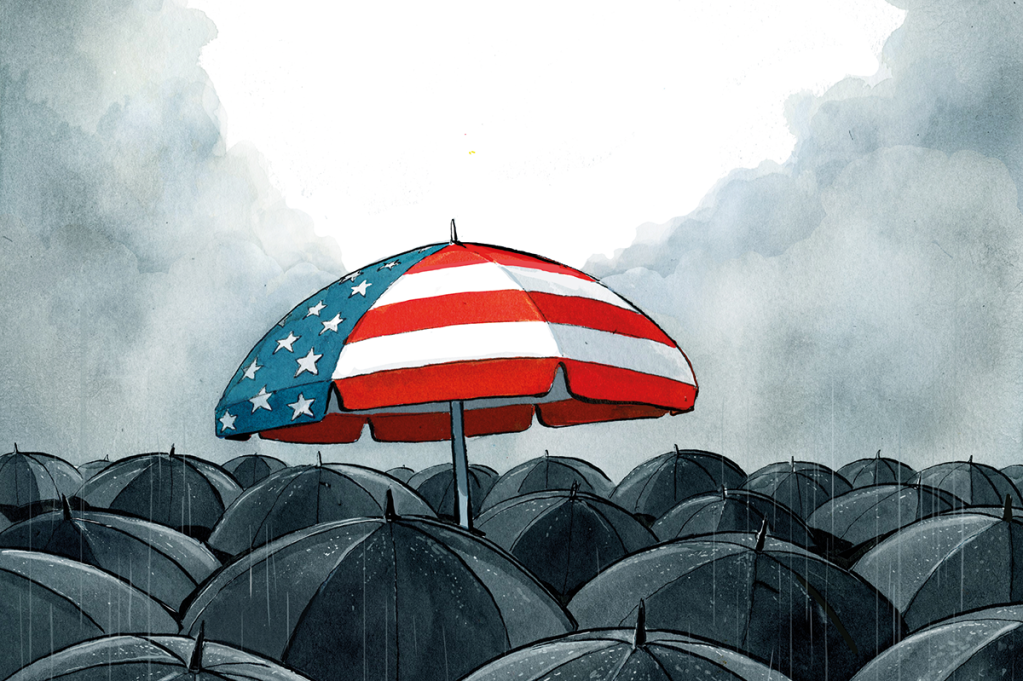One of my favorite quotes about America — mainly because it annoys so many people — comes from the historian Robert Wiebe. In his book Self-Rule, he writes:
‘Telling Americans to improve democracy by sinking comfortably into community, by losing themselves in a collective life, is calling into the wind. There has never been an American democracy without its powerful strand of individualism, and nothing suggests there will ever be.’
Cue the yelping from nationalists, socialists, Burkeans, take your pick. Yet Wiebe was less making a political argument than he was observing what was right in front of his nose. America has always been a nation of strivers, of men and women who seek to live up to their potential and who get annoyed if anyone throws a roadblock in their way. That quote, weirdly, paradoxically, sums up not just the attitude of individuals but a collective ethos. To be American is to move ever forward, in pursuit of that ‘more perfect union’. That isn’t to say we don’t value the past, but we’re more often looking at the road ahead than we are in the rearview mirror.
We saw this recently at the Republican National Convention, when Kimberly Guilfoyle screamed, ‘You are capable! You are qualified! You are powerful! And you have the ability to choose your life and determine your destiny!’ We saw a distorted version of it in the summer, when left-wing rioters decided that their narcissistic concept of progress meant much of American history had to be torn down. That’s the dark side of the striving mentality: it can too easily degenerate into cheap self-help platitudes and even Jacobin style radicalism. Sometimes we lurch ahead without considering whether it’s wise or desirable. If we invent electronic kiosks that put fast-food employees out of work, is that really progress? Are sex robots a waypoint towards a brighter tomorrow?
These are questions that Americans are going to have to confront in the years ahead. Yet there are also benefits to having the national gear shift set eternally to drive. Rather than wallowing in our problems, accepting them as indelible facts of history or insurmountable defects of the human person, we seek to overcome them.
And because this tendency toward improvement is nationally shared, it goes down easier than if it were inflicted from on high. Tocqueville’s observation that Americans solve problems through voluntary associations, whereas the British appoint lords and the French send in bureaucrats, has become trite in conservative circles, but there’s an element of truth to it still, and it allows for more sustainable change than might otherwise be.
Yet how much can one nation hope to improve? And how quickly? The year 2020 has brought with it enormous challenges and the question now is whether our reformist spirit is up to the task.
Recently Donald Trump was diagnosed with the coronavirus, the first president stricken by a pandemic in a century. And really, it’s hard to imagine it turning out any other way. This year has been nothing if not creative when answering the question ‘how could it possibly get any worse?’
The pandemic has arrived at our shores and ended the hard-earned economic boom of the early Trump years. Riots have raged through our streets; toxic Critical Race Theory, which undermines our necessary unity by shading the entire world in skin colors, has infected our elite institutions. Hurricanes menace the Gulf Coast; wildfires burn out west. Our first presidential debate was more like an armpit-farting contest than an exchange worthy of Lincoln and Douglas. Worst of all, Meghan Markle is rumored to be returning to North America, deepening our existential despair even further.
Americans sometimes talk about 2020 like it’s self-containing, as if New Year’s Eve will come and all these problems will magically vanish. Yet the coronavirus and its medical and economic wreckage are going to stretch into the next two years and beyond. So, too, may the presidential election, which (like the polar ice-storms that will no doubt threaten us next) could very well extend deep into winter.
The reason is the abundance of mail-in ballots, which have raised questions (and lawsuits) over whether the authorities are prepared to handle them and count them accurately. Fraud is already being alleged. Polls show a striking lack of confidence that the election will be conducted fairly, chilling when paired with other research that finds Americans increasingly willing to countenance violence against their political opponents.
Staring into all these portents, it can be difficult to think we aren’t on the precipice of something terrible. Historical analogies fill the air: we’re Weimar Germany, we’re 1930s Spain, we’re pre-revolutionary Russia, we’re America still but warped back to the 1850s. And that’s before we consider the other nagging challenges that existed prior to this annus horribilis. Our military is still unsustainably overextended; our national debt is still unconscionably high; our governing bodies are still paralyzed by partisanship; trust in our national institutions is still at rock bottom; our educational standards are still falling. We never quite managed to recover from the Bush administration, with its twin debacles of war in Iraq and recession, let alone the fresher crises that afflict us today.
All in all, a grim picture, less the America we grew up with than Cassandra’s disbelieved dark vision. Yet as Americans, we are required by law to be optimistic. And there is hope.
There are a few things worth bearing in mind here. The first is that our past is not the triumphal and sterilized thing we make it out to be. The postwar era — and especially the 1980s and 1990s, in which most of us millennials grew up — was something of an aberration. Most of our history has been far more unsettled and contentious.
Within 15 years of winning the Revolutionary War, the United States saw two major uprisings — Shays’s Rebellion and the Whiskey Rebellion — that threatened the stability of the new nation. Another war with Britain came in 1812; our devastating Civil War erupted in 1861, and was both preceded and followed by decades of violence stemming from our peculiar institution of slavery and its consequent racism.
The late 19th century was roiled by strikes and labor unrest; the 1910s and 1920s saw race riots that make the Portland of today look like a high-school pep rally. World War One shipped away the Doughboys and World War Two saw off their sons the GIs; 1968 brought with it a wave of assassinations and talk of revolution; the 1970s saw crime and gas lines.
Against all this, 2020 looks less like a violent departure than a return to form. America’s problems aren’t unprecedented in her history, and neither are they unique among the nations of today, no matter what certain clucking and tsking Europeans might say. Yes, we are fiscally underwater, but our national debt is still roughly on a par with or below that of a number of Eurozone countries (and well below that of notorious Greece). Molotov cocktails fly through our cities, but so do they in many European capitals, including Berlin, where in a chilling callback to history far-right protesters recently tried to storm the Reichstag.
And while our empire might be unsustainable, that arguably poses tougher questions for the Europeans than it does for us, as they continue to lean on the United States for their collective defense.
Over and over again in the age of Trump, European leaders have declared that it’s time to look beyond Washington for global leadership, yet over and over again, they never quite seem to get on with it. Which raises an (admittedly trite) question: if not America, who? What other nation is positioned to fill our role in the world?
European federalists murmur in their sleep about an all-powerful and centralized European Union, but ‘Europe’ as a cohesive and single political entity is little more than a technocratic fantasy. The United States still has the world’s biggest economy, most powerful military and one of its largest populations. America’s allies might hate Trump, but these are realities they haven’t been able to skirt.
As for America’s adversaries, they are gaining in confidence, as the egg timer dings and the vastly overstated unipolar moment comes to an end. But most of these would- be challengers are relatively weak on their own — Venezuela, the Philippines, Iran. The two exceptions, heavy-hitters both, are Russia and China, but even then neither poses the threat of, say, a Soviet Union. Russia has an economy smaller than Brazil’s; it possesses a single aircraft carrier, which last year entered an Arctic port and promptly caught fire. China is a more serious menace, of course, and its rise and horrifying totalitarianism will inevitably prove a challenge. Yet its economic fundamentals have never been as strong as is sometimes assumed and the coronavirus has united much of the world in skepticism of Beijing.
This hardly amounts to a post-American era. Yet even if we’re safe from external competition, that still leaves the issue of our domestic challenges, whether we can remain as strong internally as we appear externally. And it’s worth pointing out: the United States could very well fall. America is not immune to hubris, overstep, decline. It Can Happen Here, no matter how much we’re tempted to think otherwise. But that doesn’t mean it has to.
In Oscar Wilde’s wonderful story The Canterville Ghost, an American family moves into an English house haunted by an old and venerable specter. The ghost tries to scare them away but is repeatedly foiled: the Americans show a confidence he’s never seen before and keep fighting him off with various brand-name products they’ve brought with them. Wilde meant the story to lampoon the consumerist United States as much as old Europe. Yet he also captured well some of our better qualities: that cheerful resolve, that innovation, that ability to coexist with the unfamiliar, that problem solving practicality, that eye on the future rather than the past.
None of this guarantees our survival, but it does give us a fighting chance against our present phantoms. American history, though not a fairy tale, does usually see the darkness break: the War of 1812 was followed by the Era of Good Feelings; the Civil War ultimately brought North and South back together; the 1876 presidential election, which was contested as 2020’s might be, didn’t break the country apart; the malaise of the 1970s yielded renewal and triumph. Now our small-l liberal toolbox sits open once again. Whether we use it to build, to fix, to make this century as American as the last one, is ultimately up to us.
This article is in The Spectator’s November 2020 US edition.


















